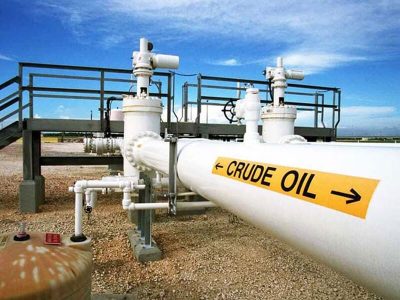Nigeria’s oil trading surplus hits $15.6m in one day
Using the price benchmark and the quota give to Nigeria by the Organisation of Petroleum Exporting Countries (OPEC), $8.69 surplus was recorded for each barrel of 1.8 million barrels of crude exported from Nigeria on Thursday into the OPEC market, making the total surplus to be over $15.642 million.
The prices of crude oil, cash cow for the country’s economy, hit a new seven months high, rising at the weekend to $68.69 per barrel buoyed by a potential war between United States and Iran.
Although President Muhammadu Buhari has signed the 2020 budget, the 2019 budget, which was signed by him in May, is still in place till May.
The budget was based on oil production of 2.3 million bpd (including condensates) with an oil benchmark price of $60 per barrel.
Oil, however, heightened Nigeria’s budget surplus hope, as it hit $68.69 a barrel.
The forecast for oil prices even surged to as high as $70 per barrel as many analysts fear a broader regional war in the Middle East.
Oil prices were already trending higher when the Energy Information Administration (EIA) released its weekly petroleum status report, pushed up by news about a U.S. air strike in Baghdad that killed a high-ranking Iranian military commander.
Brent crude traded at $68.69 a barrel, with West Texas Intermediate at 63.27 a barrel, both up by more than 3 percent since Friday’s close.
A United States strike killed Iranian General Qassem Soleimani on Thursday, and the aftermath yesterday pushed the price to $68.60 per barrel – highest in the last seven months.
Iran, second biggest crude exporter after Saudi Arabia, promised “severe retaliation,” for the attack.
Soleimani, as head of the Quds Force of the Revolutionary Guards, was a very powerful Iranian official, often likened to a shadow foreign minister. Iran promised “severe retaliation,” and many analysts fear a broader regional war. At a minimum, attacks on U.S. military installations in the Middle East are expected.
This is the latest move in a fast escalation in the Middle East that has already sparked worry about the security of supply from the world’s number-one exporting region.
Meanwhile, the EIA said earlier last week that U.S. oil production had hit a record 12.66 million barrels daily in October, with weekly estimates suggesting this could have risen further in the months since October to over 13 million bpd.
In October 2018, Brent crude hit a record high of $86.74 per barrel, a development that spurred the Federal Executive Council to peg the price of crude oil for the budget at $60 per barrel, up from $50.5 for the 2018 budget.
But Brent plummeted in November, trading below the $60 per barrel mark, with some experts saying that the government would need to review the oil price benchmark downwards.
The oil price, however, hit $75 per barrel in April for the first time in 2019.


